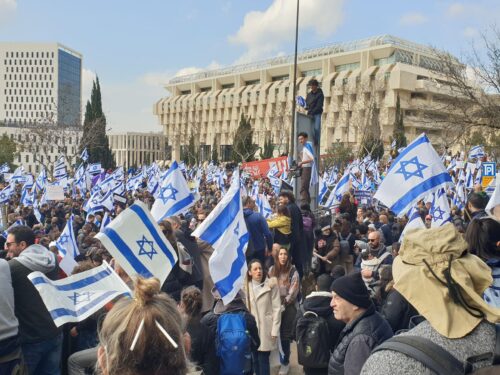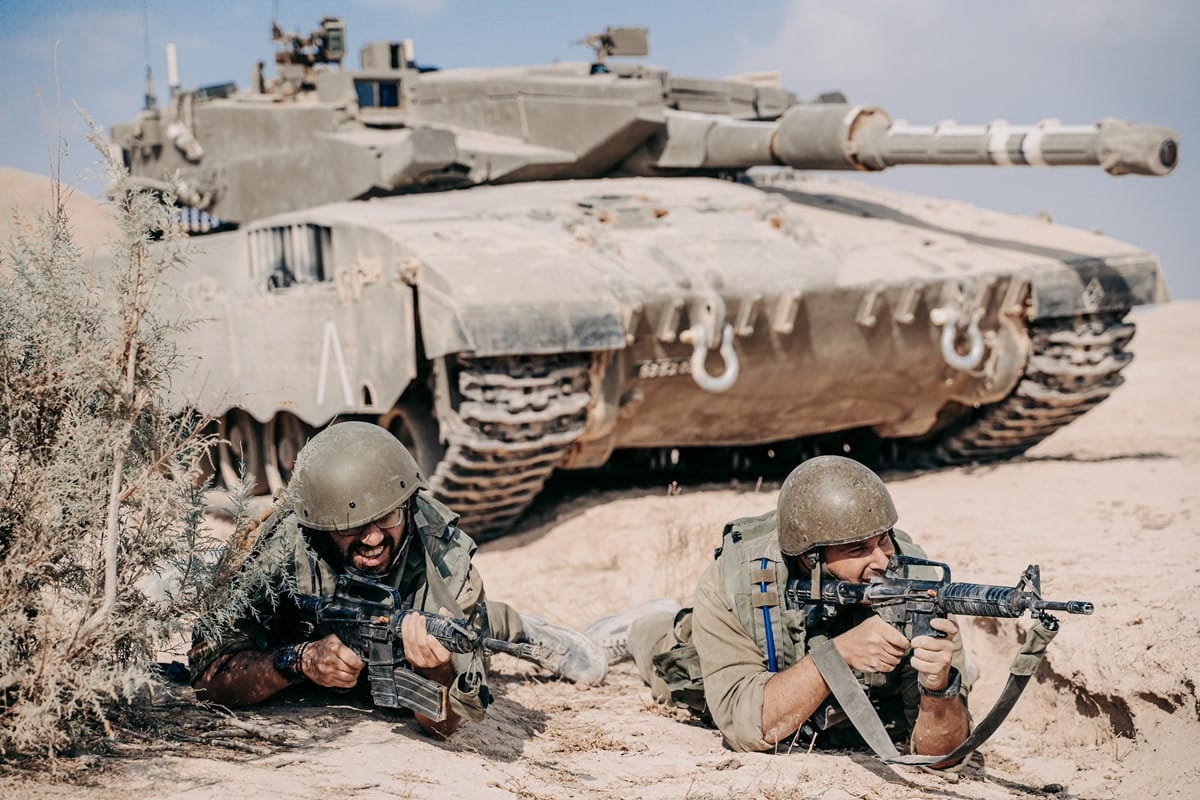
Ahiram Levi, a 30-year-old combat engineering soldier, opens our interview with an apology. He has much to say, he explains, but he isn’t quite sure how to phrase his opinions.
And indeed, as we embark on our discussion, the words come tumbling out with passion and pain. However, as the interview progresses, Ahiram gets a better handle on his thoughts and he presents structured and concise messages – sentiments shared by himself and his comrades in the field; messages that must be heard by every decision-maker in Israel.
“I speak for many reservists, all who sanctify life – regardless of their political leanings”, he wishes to clarify. “When I talk about the leadership, I mean all of Israel’s leadership – political, judiciary, military, media. As far as I’m concerned, they all should shoulder the responsibility”.
“No one wants to hire employees that will just be called back to reserves’ service”
Ahiram was summoned to report to duty at the outbreak of the October 7 attack, just eight months after his wedding, and a month after he quit his job. During the long months of fighting he also had to move and found himself contending with a complex series of personal difficulties. Added to this were the challenges from the battle field: the uncertainty, the constant fear, and the loss of comrades, which breaks the heart each and every time.
Ahiram is well aware that he’s not alone in this story. All of his comrade reservists are dealing with similar difficulties. “The reservists in particular are paying a dear price in this war, and this does not receive the attention it deserves”, he says. “I still have a hard time finding a job since no one wants to hire employees that will just be called back to duty. I have friends that because of their [prolonged] reserves’ duty have gotten divorced or have lost their jobs. There are even some reservists who have committed suicide between tours. And the public – try as it may to be supportive – doesn’t really understand how difficult things are for us”.
Despite the mounting difficulties, and personal costs, Ahiram states that if summoned again he would immediately report, no questions asked. He only has two requests, both of which he wishes to convey to Israel’s decision-makers and to the citizens of the country: respect our lives by giving us your support and letting us win, and take responsibility for the unity of the public in Israel”.
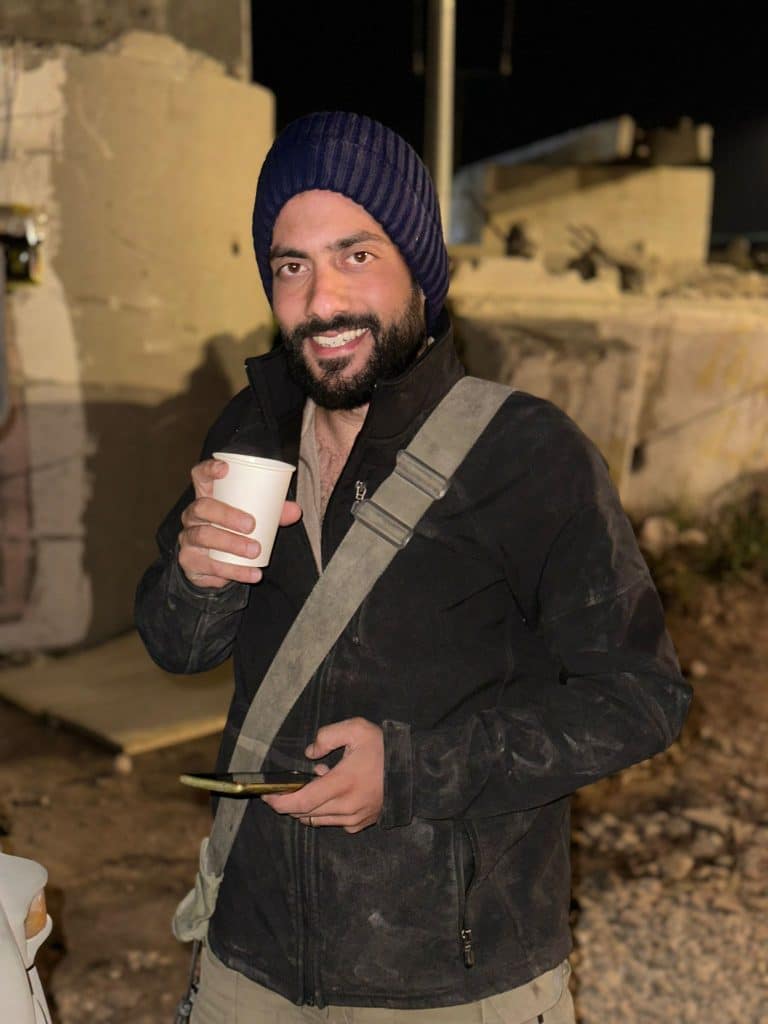
“No more back-and-forth raids”: the reservists want to win
Since October 7, uncertainty has become part and parcel of the daily lives of the Israeli public. But there are those who deal with more uncertainty than the rest. Putting aside uncertainties that are products of being a combat soldier in war, there is the uncertainty that arises from the reservist’ constant transition lately between civilian and military life. “There is a large measure of unclarity regarding the reserves’ service”’ says Ahiram. “It starts already at the moment we get our summons. I’ve repeatedly received summons that were either postponed or called off all together. You must understand that when we receive a call to report for duty, our entire life circles around the upcoming tour. We stop everything, change plans. When we receive a summons out of the blue – it makes us feel that we – and our time – are being taken for granted, because they know that whenever called – we will step up to protect the country”, he shares candidly. “But the lack of clarity doesn’t end here. During fighting we usually are not informed of the objective of our missions. We’re told to go in, get out, fight, desist. This is has become even more prevalent in the recent months of the fighting”.
Can you see any difference between the fighting at the onset of the war as oppose to now?
“Absolutely. When the war began, the troops fought intensively and aggressively, however, lately, the soldiers feel that we’re bogged down in the Gaza mire instead of driving the fighting towards victory. The leadership and the public must understand that the longer we’re in Gaza – the more soldiers die. The troops in the field want to see a return to continuous intensive fighting, coupled with heavy artillery, mopping-up operations, a concerted military effort and a broad seizure of territory; no more back-and-forth raids; no more tours. [we want] warfare that means business and says to us: ‘we brought you here from home to win this war’”.
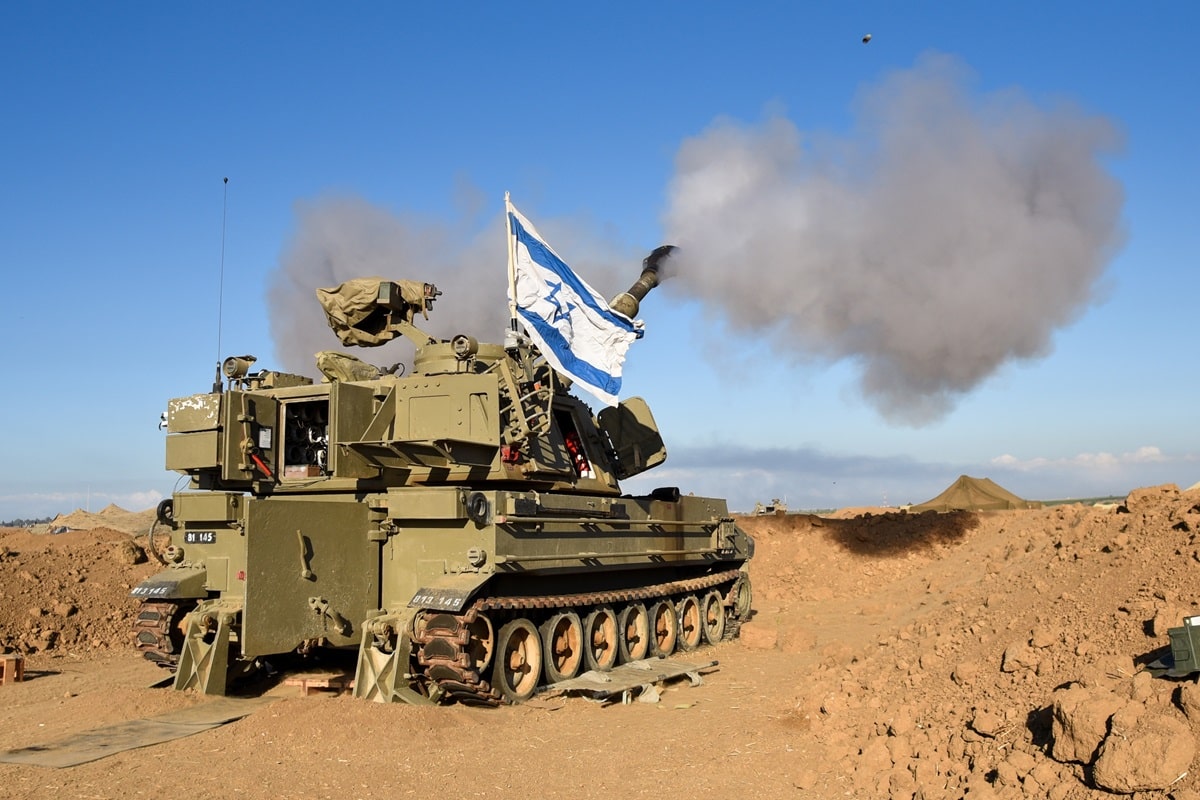
What in your opinion, is holding back the IDF from victory?
“I don’t intend to address the bringing of politics into the military; however, I would like to touch upon the considerations of international pressure. I understand that this is an important issue – but it’s not more important than our lives. The lives of the soldiers should be treated with reverence. Beyond that, there is a gap between the mindset of the troops in the field and the messages that are sent out by the leadership. As common soldiers we know beyond a shadow of a doubt that our army has everything it takes to tackle a terrorist organization – as complex is it might be – and to crush it. But without the conviction in the imperative of victory on part of the leadership, we can stay entrenched in this fight for another three years with no conclusion in sight.”
What is you view on the possible cessation of the war before all its objectives have been reached?
“As a civilian I would comment on the issue, but as a soldier it is not my place to voice an opinion. The army’s job is to execute decisions and we, as soldiers, are committed to carrying out in the field any decision coming down from the top. The problem is that we see mainly foot-dragging. It’s frustrating. We get up and leave everything – our families, our work, our businesses, and report to duty, but then have to face indecision. I say – if you don’t want to win, then don’t call us in. End the war and let it go at that. But if you do wish to win – let us fight until we do.”
“The lives of the reservists are not even on the public agenda”
On July 1st, Sergeant Major (res.) Nadav Elchanan Noller, an old and good friend of Ahiram’s, fell in battle. This is not the first friend he has lost since the beginning of the war, but Elhanan’s death had rattled him in particular.
“Every person killed is a world onto its own. But seeing such high numbers of casualties leads to indifference. The fallen march by in a long line and most of us aren’t even familiar with their names, don’t know who they are, hurt for their loss for one moment. Unfortunately, it is only when grief comes knocking at your own door you understand its meaning”, he says. “This indifference is displayed by the public as well as by the leadership”.
Ahiram says that as citizens of Israel, it is our duty to take pause to hear and honor every single name of a fallen soldier. But this is only one side of the story. “I want us to be honored and respected while we’re still alive”, he stresses. “We risk our lives and souls for the country and the public, and you don’t have to see the epitaph ‘Rest in Peace’ near our names to call us heroes. We don’t need to be loved as dead heroes”.
How would you have the leadership treat the soldiers and reservists differently?
“I expect the leadership to back us up: in the battles in the field as well as in life outside the battlefield. At the moment the sentiment is that everything is on the table – international relations, the economic situation, the hostages, the evacuees. Everything but us. I’m not underestimating any of these issues; they’re all important. But it is not acceptable that the lives of the reservists are not on the public agenda as well. The day Nadav was killed, the sole issue on everyone’s mind was whether to reconnect Gaza to electricity or not. It feels like were getting stabbed in the back; it’s as if the lives of the Gazans are more important than those of the reservists. You have to understand that the attempts to appease the international community not only divert the limelight from us, but also lead to decision-making that impedes our ability to fight – reconnecting Gaza to the electricity helps Hamas and most of the humanitarian aid reaches the terrorists’ hands and reenforces them. Creative alternatives can be put in place that can protect our international interests but also allow us to engage in continuous aggressive operation. Furthermore, we also want to see an enveloping support system for us and our families. That means real financial aid and not occasional benefits of one sort or another, as the reservists cannot shoulder that burden on top of everything else.”
What do you expect of the Israeli public?
“There are amazing people who have been nonstop supporting the soldiers, the wounded and the families of the victims. Nonetheless, most of the public has returned to routine life, and this manifests in the levels of volunteering and emotional involvement on their part. It’s understandable. I didn’t expect the level of support at the beginning of the war to continue on such a scale, and at the end of the day – we’re out there fighting so that the public can live its routine life, but still, it’s hard for me to deal with the indifference in society now and the obliviousness to the difficulties that the reservists are experiencing”.
What can be done to help the reservists?
“People want to tell us ‘Well done’ and even reach into their pockets and donate. But when they encounter these difficulties in a challenging setting – they don’t really know how to help. I’m not saying that everyone needs to volunteer, but there are other ways to share the burden, like refraining from firing employees that are absent due to reserves duty, despite the difficulties. Similarly, employers should be patient with employees returning from reserves duty and have difficulties readjusting. Furthermore, the families of reservists should be supported, especially the wives, who are alone at home with the children. Generally speaking, society can – and should – be sensitive about seeing how it can help others, even if it’s not clear what difficulties they’re dealing with.”

“The TV studios are like kindergartens”
One of the most common expressions heard since the onslaught of the war is “unity”. We encounter it in almost every junction, on signs proclaim “Together We Shall Win”. We hear it repeatedly in politicians’ speeches. Commanders preach it to their soldiers. Social media posts are replete with it and it appears in musical releases – but as far as Ahiram is concerned, at the moment unity is little more than a catchy slogan.
“I watch what goes on in the TV studios – they’re like kindergartens now”, he says. “It’s hard to watch our leaders go at each other’s throats, and foment intrigue. We’ve reached a state in which the government is identified with the right and the army – with the left. This is unacceptable. I want to call on all levels of the political and military leadership – and to the media as well – be responsible. Think twice before you speak and ask yourself wither your cultivating love or stoking hate; promoting unity or fomenting discord”.
According to Ahiram, there is a significant gap between the manner in which the Israeli leadership and society manage disputes and how the soldiers and reservists handle them. “There is a very high degree of cohesion among the reservists. We are able to conduct discussions bringing up opinions across the political spectrum and do so in a respectful manner. Sometimes I feel that we have parallel universes here – the universe in which the reservists exist and that of the outside world”.
Still, how can unity be promoted in the “outside world”?
“It is the leadership that must take the responsibility for promoting unity among the people – this should be the number one priority of the Knesset. It starts with the way the politicians themselves talk to each other and continues with the comments we hear in the media. We must shift the idea of unity from a slogan into practice and get it into our heads that if we continue to split into factions and camps, and if we don’t learn how to build a future for us all – we’ll simply no longer be here”.
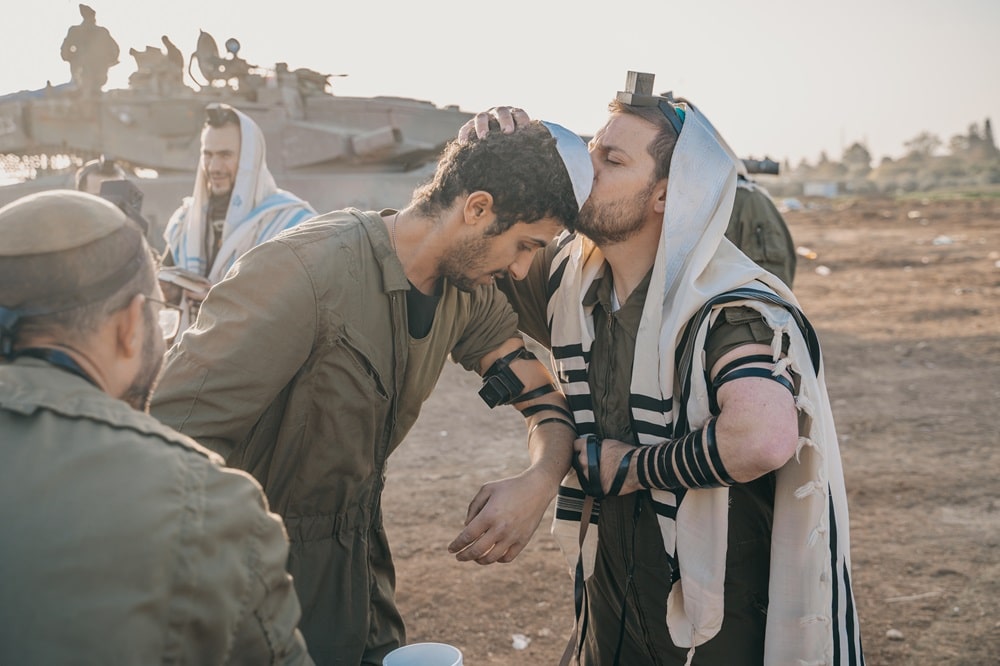
“I’m needed, so I’m there”
As of now, Ahiram Levi is back at his civilian life, but he knows that at any moment he could be summoned back to reserves’ duty. And it is clear to him that if he is– he will report for duty. Meanwhile, as long as he is home, he is working on his fresh marriage, getting used to his new house, and trying to finally find a job. And in between it all, he visits the troops, but as a volunteer. Beyond Ahiram’s important contribution as a fighter, he has also recently founded the “Unity War Room” – an organization dedicated to helping soldiers, operating under the slogan “Because We Have No Other Country”. Ahiram and his volunteers travel the country, distributing food and gear to soldiers and mainly conveying to them: we see you.
How do you find the motivation to continue to serve and volunteer?
“What gives me the strength is the knowledge that the people of Israel have experienced difficulties throughout history, and prevailed. When you stick to a narrow view – it’s hard to get up in the morning. But adopting a perspective that sees us as a link in a long line of Jewish generations, allows me to rise above the hardships. I also understand that no one else is going to do it for me and my family. I’m needed – so I’m there.”
Now that you’ve expressed such painful thoughts, what is your message to Israel’s leadership?
“My first message is: take responsibility and show us we are important. Put our lives on the scales when you weigh your decisions and give us real support. The second message is: don’t toy with us. If you want to win the war – let us fight properly and bring about its conclusion. Don’t leave us in this limbo because we are sick of sacrificing our lives because of your indecision.”



